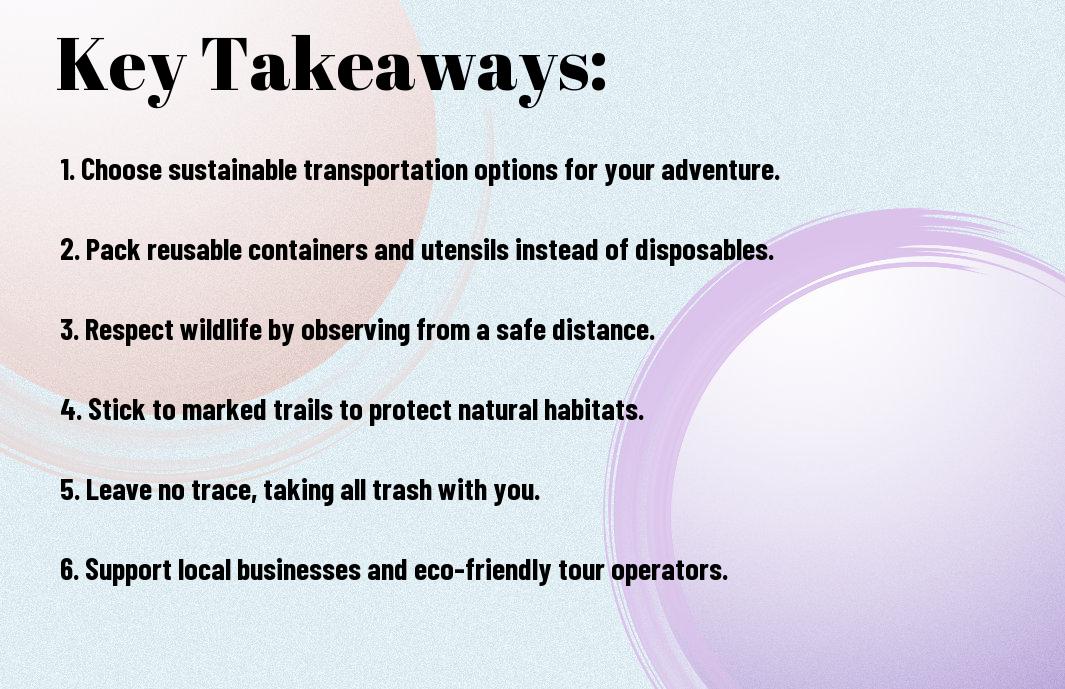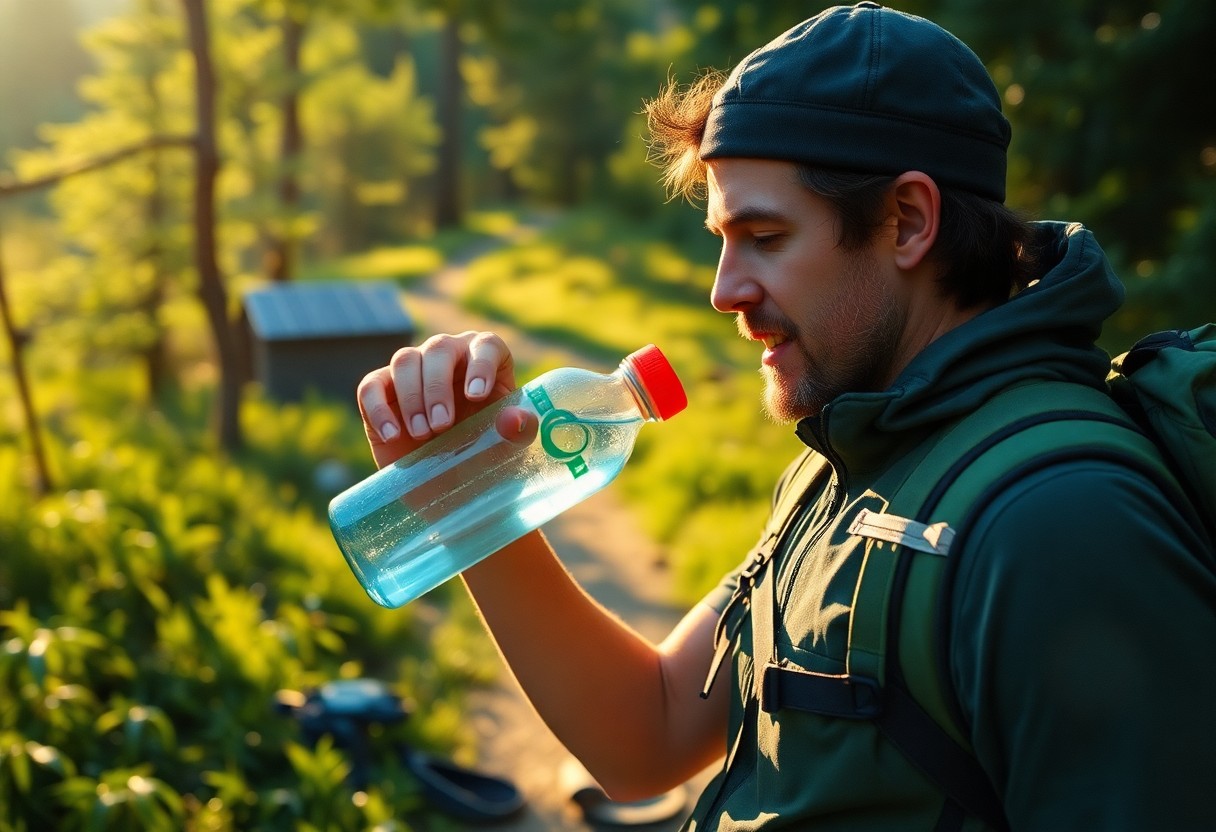As you plan your next outdoor adventure, you can make a positive impact on the environment. You have the power to minimize your ecological footprint while still enjoying nature’s beauty. Your outdoor activities can be tailored to be eco-friendly, allowing you to explore and appreciate the natural world without harming it. You will learn how to make conscious choices to reduce your waste, conserve resources, and preserve the environment for future generations.
Key Takeaways:
To ensure a more sustainable approach to exploring the outdoors, consider the following points:
- Plan your itinerary carefully to minimize waste and reduce your carbon footprint by choosing activities and destinations that have a low environmental impact.
- Use eco-friendly gear and products, such as reusable water bottles, biodegradable soap, and sustainable clothing to reduce the amount of pollution and waste generated during your adventures.
- Follow the leave-no-trace principles by staying on designated trails, respecting wildlife, and not littering to preserve the natural beauty and biodiversity of the environments you visit.


Planning Your Eco-Friendly Adventure
Your outdoor adventures can have a significant impact on the environment, but with some planning, you can minimize your footprint. Consider the location, duration, and type of activity to ensure a sustainable experience.
Choosing Eco-Friendly Gear
On the path to eco-friendly adventures, opting for gear made from sustainable materials, such as recycled or biodegradable products, is a great starting point. You can choose reusable water bottles, solar-powered chargers, and energy-efficient camping stoves.
Selecting Sustainable Destinations
Safeguarding the environment is key when selecting your destination, so you should choose places with minimal human impact and well-managed tourism infrastructure. You can look for destinations with eco-tourism certifications or those that support conservation efforts.
Also, when selecting sustainable destinations, you should research the local regulations and guidelines for visitors, and make sure to respect the local flora and fauna, as well as the community. You can also consider visiting during the off-season to avoid contributing to overcrowding and strain on local resources.
Reducing Waste on the Go
One of the most effective ways to minimize your environmental impact while exploring the outdoors is to reduce waste. You can achieve this by adopting a few simple habits and making conscious choices about the products you use and discard.
Packing Light and Avoiding Single-Use Plastics
Behind every successful eco-friendly adventure is careful planning and preparation. You can significantly reduce your waste output by packing light, choosing reusable containers, and avoiding single-use plastics, allowing you to enjoy your outdoor experiences without harming the environment.
Composting and Recycling on the Trail
Around every campsite or trailhead, you’ll find opportunities to manage your waste responsibly. You can compost food waste and recycle non-organic materials, keeping your outdoor space clean and preserved for future generations to enjoy.
Reducing your waste on the trail requires some extra effort, but it’s worth it to preserve the natural beauty of the outdoors. You can take advantage of composting and recycling programs offered at many campsites and parks, or take matters into your own hands by bringing reusable bags and containers to collect and store your waste, ensuring that you leave the environment in the same condition as you found it.
Respecting the Environment
Keep your outdoor adventures eco-friendly by taking steps to minimize your impact on the environment. You can start by being aware of your surroundings and taking care to avoid harming the natural world.
Following Leave No Trace Principles
Regarding the principles of Leave No Trace, you should take nothing but memories and leave nothing but bubbles, ensuring that your presence in the outdoors does not disrupt the environment.
Being Mindful of Wildlife and Their Habitats
Being considerate of the wildlife and their habitats is crucial to preserving the natural balance. You should keep a safe distance from animals and avoid disturbing their habitats to ensure their well-being.
Also, when you’re being mindful of wildlife and their habitats, you’ll want to educate yourself on the local species and their needs, so you can take steps to avoid disrupting their natural behaviors and habitats, allowing you to coexist with them in a harmonious way, and making your outdoor adventures not only enjoyable but also sustainable for you and the environment.
Sustainable Camping Practices
After setting out on your outdoor adventure, it’s imperative to adopt sustainable camping practices to minimize your environmental footprint. You can reduce your impact by choosing campsites wisely, using eco-friendly gear, and following best practices.
Choosing Campsites with Minimal Impact
Campsites that are established and well-maintained are ideal, as they reduce the risk of damaging the surrounding environment. You should look for sites that have minimal vegetation and are away from sensitive ecosystems, allowing you to enjoy nature without harming it.
Using Eco-Friendly Camping Gear and Supplies
Camping equipment and supplies can have a significant impact on the environment, but you can make a difference by choosing eco-friendly options. You should opt for gear made from sustainable materials, such as recycled polyester or bamboo, and avoid single-use plastics.
Practices such as properly disposing of waste, using a portable stove, and conserving water are also vital when using eco-friendly camping gear and supplies. You can take your sustainability to the next level by investing in a water filter or purification tablets, allowing you to source water from natural sources while minimizing your waste output.
Minimizing Carbon Footprint
Once again, you have the power to reduce your environmental impact by making conscious choices. Consider the effects of your transportation and accommodation on the environment, and opt for eco-friendly alternatives whenever possible.
Using Public Transportation or Carpooling
To reduce your carbon footprint, you can use public transportation, walk, or bike whenever possible, or carpool with friends or fellow travelers to minimize the number of vehicles on the road.
Offsetting Carbon Emissions from Travel
On your next adventure, you can offset your carbon emissions from travel by investing in carbon offset projects, such as reforestation or renewable energy, to balance out the emissions from your trip.
Even if you can’t completely eliminate your carbon emissions, you can take steps to offset them by calculating the emissions from your trip and investing in projects that reduce greenhouse gas emissions elsewhere, allowing you to make a positive impact on the environment and compensate for your travel footprint.
Supporting Eco-Friendly Tourism
All your outdoor adventures can have a positive impact when you choose eco-friendly tourism options. You can learn more about how to make your outdoor adventure more sustainable and make informed decisions.
Choosing Local and Sustainable Tour Operators
To ensure your trip is eco-friendly, you opt for local and sustainable tour operators who follow environmentally responsible practices, minimizing your impact on the environment.
Supporting Conservation Efforts and Local Communities
The local communities and conservation efforts can benefit from your support, enabling you to contribute to the preservation of natural habitats and cultural heritage.
Hence, when you support conservation efforts and local communities, you are directly contributing to the protection of the environment and promoting sustainable tourism practices, allowing you to enjoy your outdoor adventures while making a positive impact on the destinations you visit.
Summing up
Hence, by implementing simple changes, you can make your outdoor adventures eco-friendly. You can reduce your impact on the environment by choosing reusable gear, minimizing waste, and respecting wildlife. As you plan your next adventure, consider your actions and make sustainable choices to preserve the beauty of nature for your future explorations. By taking these steps, you will contribute to a healthier planet and enjoy your outdoor experiences with a clearer conscience, knowing you are protecting the environment for your own and future generations.
FAQ
Q: What are some simple ways to reduce my environmental impact when planning an outdoor adventure?
A: When planning an outdoor adventure, consider choosing destinations that are close to your home to reduce carbon emissions from transportation. You can also opt for public transport, carpool, or bike to the location. Additionally, pack lightly to minimize waste and avoid single-use plastics. Researching the area beforehand to understand any specific environmental concerns and regulations can also help you make more informed decisions.
Q: How can I minimize my waste during outdoor adventures?
A: Minimizing waste during outdoor adventures can be achieved by adopting a few simple habits. Bring reusable bags, containers, and water bottles to avoid single-use plastics. Choose products with minimal or biodegradable packaging, and avoid buying items with excess packaging. If you need to purchase supplies, opt for items that can be reused, such as a portable coffee filter instead of disposable coffee cups. Always carry a small bag to collect your trash and dispose of it properly when you return.
Q: What are some eco-friendly camping practices I should follow?
A: When camping, it’s vital to follow eco-friendly practices to minimize your impact on the environment. Choose campsites that are designated and follow the principles of “leave no trace.” This means disposing of waste properly, not polluting water sources, and not damaging the vegetation. Use eco-friendly camping gear, such as solar-powered chargers and LED lights, and avoid making campfires in sensitive ecosystems. Additionally, respect local wildlife and keep a safe distance to avoid disrupting their habitats.
Q: How can I reduce my water usage during outdoor adventures?
A: Reducing water usage during outdoor adventures is vital to conserve this precious resource. Bring a water filter or purification tablets to avoid buying bottled water. Use biodegradable soap and toothpaste, and wash dishes and hands in a bucket to conserve water. When swimming or bathing in natural water sources, avoid using harsh chemicals that can harm aquatic life. Finally, report any water pollution or issues you encounter to local authorities to help maintain the health of these ecosystems.
Q: What are some ways to respect and protect local wildlife during outdoor adventures?
A: Respecting and protecting local wildlife is vital during outdoor adventures. Keep a safe distance from animals to avoid disrupting their natural behaviors, and never feed them as this can alter their diets and make them dependent on humans. Avoid littering and disposing of trash properly, as it can harm wildlife who may mistake it for food. Be mindful of sensitive habitats and avoid damaging vegetation or disturbing nests. Finally, support local conservation efforts and respect any rules or regulations in place to protect wildlife, such as staying on designated trails and not touching or handling animals.
